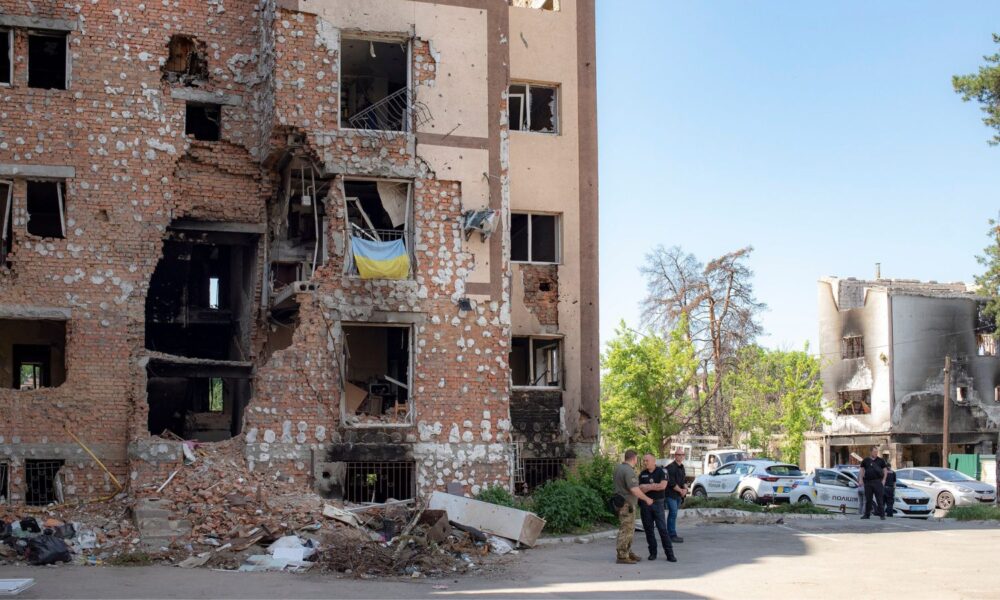On the eve of the anniversary of Russia’s invasion of Ukraine, there’s been a lot of stock-taking. News outlets are tallying up the casualties and the dead, the cities and regions under attack, the ground gained and lost.
Undergirding these grim statistics is the terrifying threat, always present, that if the conflict escalates, Russia might use its nuclear weapons. This threat was given alarming new weight this month, when President Vladimir Putin ordered a test of his country’s newest long-range Sarmat missile, capable of carrying up to ten nuclear warheads.
Days after the invasion last year, my colleague and UCS Global Security Program director Tara Drozdenko said, “Along with the fall of the Soviet Union, this is probably the most consequential event related to nuclear weapons in my lifetime.” Today, with a year of erratic statements and actions from President Putin who has escalated and then walked back nuclear threats, and then escalated again, Tara’s words ring truer than ever.
Nuclear weapons will not win a war in this moment, or ever.
Nuclear weapons do not keep us safe. To the contrary, nuclear weapons introduce an unacceptable level of risk that any conflict could escalate to a world-changing catastrophe. Russia’s invasion of Ukraine is just the latest example of a nuclear-armed state jeopardizing the safety of the entire world.
It is past time to reduce the nuclear threat. While we can’t control what Russia does, the United States can set a model for the world by implementing sensible nuclear policies for our nation.
National budgets should reflect our real priorities
Late last year, Congress approved and President Biden signed the largest-ever defense budget: an incredible $858 billion. Of this bloated sum, more than $50 billion is directed not only to maintain our arsenal of nuclear weapons, but to build new nuclear weapons systems. Nearly every world leader, including President Putin at various points, agrees that nuclear weapons cannot and must not ever be used (“We have not gone crazy,” he said in December). That means the United States is spending more than $50 billion in one year on useless, pointless weaponry.
If spending billions on nuclear weapons made us safe, secure, and stable, we would be safe, secure, and stable, many times over. However, this wasteful spending diverts funding from the real and immediate threats to our health and safety. The United States experienced 18 $1 billion disasters last year, fueled by climate change. We’ve lost more than one million people to COVID-19 since 2020, the pandemic’s effects exacerbated by poverty, disinformation campaigns, and underfunded public health departments. Far too many families and individuals in the United States are struggling to afford necessities, from food to medication to housing. As Dr. Martin Luther King, Jr. cautioned in 1967, “A nation that continues year after year to spend more money on military defense than on programs of social uplift is approaching spiritual doom.”
We don’t have to keep doing this
It’s difficult to challenge the status quo around defense spending and nuclear weapons, especially if you’re an elected official who wants to avoid at literally all costs the appearance of being soft on national security. But while these ever-increasing budgets can seem inevitable, they are the result of our choices—and we can make different choices. As author Ursula K. LeGuin said, “Any human power can be resisted and changed by human beings.” Nuclear weapons were made by humans, are funded by humans, and can be unfunded by us as well. And when our politicians make this choice, it doesn’t have to spell the end of their careers. In fact, in last year’s midterm elections, out of 129 members of Congress who voted to cut the Pentagon’s budget, 128 won their races for re-election, including four Republicans. Perhaps voters are ready for more representatives to take principled stands against exorbitant budgets for nuclear weapons. And if they do, they can back up that stand with science-based analysis—which tells us that there are sensible alternatives to the current plan to rebuild and replace our entire nuclear arsenal.
What real security looks like
The good news: there are plentiful common-sense measures we can take right now that will actually make us safer, even in today’s geopolitical climate, even if President Putin continues to engage in nuclear saber-rattling. And none of them will cost anywhere near $50 billion.
- End sole authority: President Biden currently has the power to deploy nuclear weapons within minutes, on his own sole authority, without consulting anyone else—even Congress, or his own defense secretary. This power has passed from president to president for decades, but the president could end it tomorrow. It is dangerous and undemocratic for one person to possess the unchecked authority to start a nuclear war, and there are many alternatives for smarter, safer policies concerning who can order a nuclear strike.
- Enact a no-first-use policy: Under our current policies on deploying nuclear weapons, the U.S. will never strike first against the majority of countries in the world—those without nuclear weapons that are abiding by the Nonproliferation Treaty. However, this policy leaves open the possibility of being the first to use nuclear weapons in conflicts with nuclear-armed states, including China, Russia, and North Korea. A no-first-use nuclear policy means that the United States would commit to never being the first nation to use nuclear weapons in any conflict, which would make us safer.
- Create a more inclusive process around decision-making, and in policy spaces on nuclear weapons: The people most affected by nuclear weapons, including those who lived downwind of weapons testing sites and are dealing with lifelong health consequences, and the Black, Brown, and Indigenous communities who live near radioactive pollution dump sites, among others, do not get a voice when our representatives make decisions about nuclear policies. The nuclear policy community must include and welcome anti-racist and anti-colonialist activists and thinkers.
- Cut our defense budget: We can elect, and re-elect, representatives who promise to cut down wasteful spending on our defense budget, including nuclear weapons. There is no need for the United States to outspend the defense budgets of the closest nine countries combined. Our politicians would also do well to demand budgetary accountability from the Pentagon, which has failed to pass regular, Congressionally-mandated financial audits, by withholding a percentage of funding if they cannot pass these audits.
- Eliminate nuclear weapons worldwide.
Each and any of these steps will bring us closer to a world where nuclear-armed states can’t threaten the safety of all of us on Earth. As we approach the milestone of a year’s worth of worrying if one state leader will escalate his war in Ukraine to the unthinkable, it’s time to start making changes at home that will make nuclear wars far less likely.

